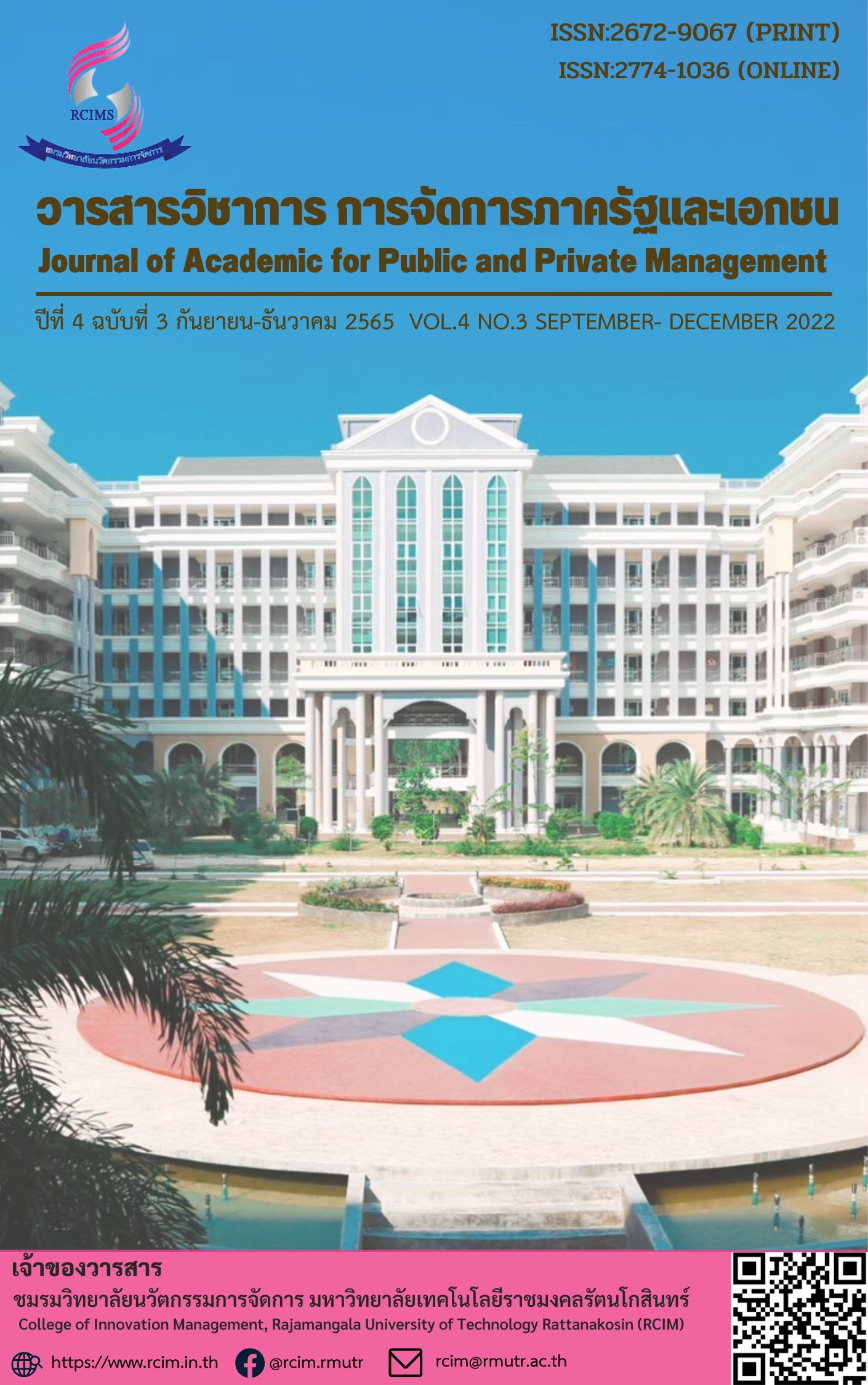อิทธิพลของสมดุลชีวิตกับการทำงาน ต่อความตั้งใจลาออก และความตั้งใจคงอยู่กับองค์กร ในกลุ่มบุคลากรภาคการศึกษา
Main Article Content
บทคัดย่อ
บทความนี้มุ่งศึกษาอิทธิพลของสมดุลชีวิตกับการทำงานที่มีต่อความตั้งใจลาออก และความตั้งใจคงอยู่กับองค์กรในกลุ่มบุคลากรภาคการศึกษา โดยคัดเลือกกลุ่มตัวอย่างจากข้อมูลการสำรวจความสุขคนทำงาน พ.ศ. 2564 จำนวน 2,028 คน มาวิเคราะห์องค์ประกอบ (factor analysis) เพื่อจำแนกองค์ประกอบของสมดุลชีวิตกับการทำงาน ตามแนวคิดของ Greenhaus และคณะ (2003) ผลการศึกษาอิทธิพลของสมดุลชีวิตกับการทำงานที่มีต่อการลาออก และการคงอยุ่กับองค์กร โดยการวิเคราะหการถดถอยโลจิสติกแบบทวิ ชี้ว่า สมดุลชีวิตกับการทำงานที่ดีขึ้น ช่วยลดโอกาสในการลาออกจากองค์กรของบุคลากรการศึกษา และเพิ่มโอกาสที่บุคลากรจะคงอยู่กับองค์กร โดยเมื่อจำแนกองค์กรประกอบ (factor analysis) สมดุลชีวิตกับการทำงาน พบว่า สมดุลด้านการมีส่วนร่วมในการทำงานของบุคลากร และสมดุลด้านความพึงพอใจ ช่วยเพิ่มโอกาสที่บุคลากรจะคงอยู่กับองค์กร (Adjusted odd ratio: AOR = 1.43 และ 2.3 ตามลำดับ) และช่วยลดโอกาสที่บุคลากรภาคการศึกษาจะตั้งใจลาออก (AOR = 0.66 และ 0.45ตามลำดับ)
การศึกษานี้ชี้ให้เห็นถึงประโยชน์ของการการสร้างเสริมสมดุลชีวิตกับการทำงาน ซึ่งจะช่วยลดทอนอัตราการลาออก และเพิ่มอัตราการคงอยู่กับองค์กรได้ โดยกลยุทธ์ในการรักษาบุคลากรให้คงอยู่กับองค์กร ควรมุ่งให้ความสำคัญกับการสร้างสมดุลด้านการมีส่วนร่วม และสมดุลด้านความพึงพอใจเป็นหลัก
Article Details

อนุญาตภายใต้เงื่อนไข Creative Commons Attribution-NonCommercial-NoDerivatives 4.0 International License.
เอกสารอ้างอิง
กระทรวงแรงงาน. (2565). หนังสือสถิติแรงงานประจำปี 2564. (พิมพ์ครั้งที่ 1). กรุงเทพฯ: กองเศรษฐกิจการแรงงาน สำนักงานปลัดกระทรวงแรงงาน.
Acharya, K. P., Ghimire, T. R., & Subramanya, S. H. (2021). Access to and equitable distribution of COVID-19 vaccine in low-income countries. npj Vaccines, 6(1), 1-3.
Aslani, F., & Fayyazi, M. (2015). The impact of work-life balance on employees' job satisfaction and turnover intention: the moderating role of continuance commitment. International Letters of
Becker, H. S. (1960). Notes on the concept of commitment. American journal of Sociology, 66(1), 32-40.
Chen, M.L., Su, Z.Y., Lo, C.L., Chiu, C.H., Hu, Y.H., & Shieh, T.Y. (2014). An empirical study on the factors influencing the turnover intention of dentists in hospitals in Taiwan. Journal of Dental Sciences, 9, 332-344.
Clark, S. C. (2000). Work/family border theory: a new theory of work/family balance. Human Relations. 53, 747-770.
Digilio, J. & Toiaivao, C. (2022). The Great Resignation: Obstacle or Opportunity?. AALL SPECTRUM. Retrieved from https://aallspectrum.aallnet.org/html5/reader/production/default.aspx? pub name =&edid=01daf59e-2a1b-4ce0-a5a2-5b2820813a7f&pnum=22
Greenhaus, J. H., Collins, K. M., & Shaw, J. D. (2003). The relation between work-family balance and quality of life. Journal of Vocational Behavior, 63(3), 510–531.
Grzywacz, J. G., & Carlson, D. S. (2007). Conceptualizing work–family balance: Implications for practice and research. Advances in Developing Human Resources, 9, 455– 471.
Hassan, M., Jambulingam, M., Alam, M. N., & Islam, S. (2019). Redesigning the retention strategy against the emerging turnover of Generation Y: Revisiting the long-standing problems from 20Th to 21St century. International Journal of Entrepreneurship, 23(2), 1-16.
Hill, E., Hawkins, A. J., Ferris, M., & Weitzman, M. (2001). Finding an extra day a week: The positive influence of perceived job flexibility on work and family life balance. Family Relations, 50, 49–58.
Hom, P. W. & Griffeth, R. W. (1995). The employee turnover process. Research in Personnel and Human Resources Management, 13, 245-293.
Jaharuddin, N. S., & Zainol, L. N. (2019). The Impact of Work-life Balance on Job Engagement and Turnover Intention. The South East Asian Journal of Management, 13(1), 7.
Jermsittiparsert, K., & Urairak, B. (2019). Exploring the Nexus between Emotional dissonance, Leadership, Organizational Commitment, Job Satisfaction and Intention to Leave among Medical Professionals in Thailand. Utopía y Praxis Latinoamericana, 24(6), 378-386.
Joao, T.F., & Coetzee, M. (2012). Job Retention Factors, Perceived Career Mobility and Organisational Commitment in the South African Financial Sector. Journal of Psychology in Africa, 22(1), 69–76.
Kaya, H. & Abdioğlu, H. (2010). An Empirical Study on Employee Turnover Tendency. Todade’s Review of Public Administration, 4(4).141-183.
Kelliher, C., Richardson, J., & Boiarintseva, G. (2019). All of work? All of life? Reconceptualising work‐life balance for the 21st century. Human Resource Management Journal, 29(2), 97-112.
Kirchmeyer, C. (2000). Work-life initiatives: Greed or benevolence regarding workers’ time? In C. L. Cooper & D. M. Rousseau (Eds.), Trends in organizational behavior: Time in organizational behavior (Vol. 7, pp. 79 –93). Chichester, United Kingdom: Wiley.
Kumar, R. (2011). Turn over issues in the textile industry in Ethiopia: A case of Arba Minch Textile Company. African Journal of Marketing Management, 3(2), 32-44.
Lee, Y.W., Dai, Y.T., Chang, M.Y., Chang, Y.C, . Yao, K.G., & Liu, M.C. (2017). Quality of Work Life, Nurses' Intention to Leave the Profession, and Nurses Leaving the Profession: A One-Year Prospective Survey. Journal of Nursing Scholarship, 49 (4), 438-444.
Lyness, K. S., & Judiesch, M. K. (2008). Can a manager have a life and a career? International and multisource perspectives on work–life balance and career advancement potential. Journal of Applied Psychology, 93, 789–805.
Marks, S. R., & MacDermid, S. M. (1996). Multiple roles and the self: A theory of role balance. Journal of Marriage and the Family, 58, 417– 432.
Modau, F. D., Dhanpat, N., Lugisani, P., Mabojane, R., & Phiri, M. (2018). Exploring Employee Retention and Intention to Leave within a call Centre. SA Journal of Human Resource Management, 16(1), 1-13.
Montana, P. J., & Petit, F. (2008). Motivating Generation X and Y on the job and preparing Z. Global Journal of Business Research, 2(2), 139-148.
Nadiri, H. &Tanova, C. (2010). An investigation of the role of justice in turnover intentions, job satisfaction, and organization citizenship behavior in hospitality industry. International Journal of Hospitality Management, 29, 33-41.
Ngamkroeckjoti C. et al (2012). Determinant Factors of Turnover Intention: A case study of Air Conditioning Company in Bangkok,Thailand. International Conference on Trade,Tourism and Management (ICTTM'2012) December 21-22, 2012 Bangkok (Thailand)
Phuekphan, P., Aungsuroch, Y., & Yunibhand, J. (2021). A Model of Factors Influencing Intention to Leave Nursing in Thailand. Pacific Rim International Journal of Nursing Research, 25(3), 407-420.
Pierre, X., & Tremblay, D.G. (2011). Levels of Involvement and Retention of Agents in Call Centres: Improving well-being of employees for the Better Socioeconomic Performance. Journal of Management Policy & Practice, 12(5), 53–71.
Robert Walters. (2022). The Great Resignation Reality Check. Retrieved from https://www.robertwalters.co.th/great-resignation-reality-check.html
Serenko, A. (2022). The Great Resignation: the great knowledge exodus or the onset of the Great Knowledge Revolution?. Journal of Knowledge Management, https://doi.org/10.1108/JKM-12-2021-0920
Shamsuzzoha, A., & Shumon, R. H. (2013). Employee Turnover-a Study of its Causes and Effects to Different Industries in Bangladesh. 63-64.
Smit, W., Stanz, K., & Bussin, M. (2015). Retention Preferences and the Relationship between Total Rewards, Perceived Organizational Support and Perceived Supervisor Support. SA Journal of Human Resource Management, 30(2), 1–13.
US Bureau of Labor Statistics. (2021). Economic News Releases. Retrieved from https://www.bls.gov/bls/newsrels.htm
Yam, L., & Raybould, M. (2019, April). Exploring the Job Embeddedness Construct as a Predictor of Intention to Leave in Hospitality Workers. In The 3rd International Conference on Tourism and Business 2019.
YPulse. (2021). Why The Great Resignation is Happening in Western Europe Too?. Retrieved from https://www.ypulse.com/article/2021/11/02/why-the-great-resignation-is-happening-in-western-europe-too/#


